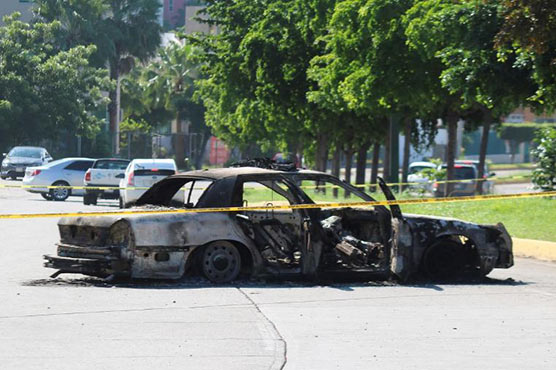Explainer: Mexico's week of bloodshed. What is going on?

The cartel's decentralized structure had allowed it to adapt, the report added.
MEXICO CITY (Reuters) - Mexico’s President Andres Manuel Lopez Obrador took office in December, promising not to repeat the “failed policies” of past administrations that have done little to stem a tide of drug-related violence that cost some 29,000 lives last year.
But events in the states of Sinaloa, Michoacan and Guerrero this past week, including two mass killings and an all-out gun battle on Thursday that saw security forces overwhelmed by cartel gunmen, have raised questions about the effectiveness of his new security strategy.
WHAT HAPPENED IN MEXICO THIS PAST WEEK?
On Monday, cartel hitmen shot dead at least 13 police in an ambush in Aguililla in the western state of Michoacan, long convulsed by turf wars between drug gangs, latterly the Jalisco New Generation Cartel (CJNG) and its enemies.
The following day, a gunfight left 14 civilians and one soldier dead in Tepochica, near Iguala, a city notorious for the 2014 disappearances of 43 student teachers. Tuesday’s mass killing in Guerrero raised questions about whether the armed forces used excessive force, reviving the specter of past executions.
Then came the bungled arrest on Thursday of the son of jailed kingpin Joaquin “El Chapo” Guzman that turned the streets of Culiacan in Sinaloa into a scene of nightmarish urban warfare.
Cartel gunmen surrounded security forces in the northwestern city and made them free Ovidio Guzman after his brief capture.
WHAT’S THIS NEW SECURITY STRATEGY?
Veteran leftist Lopez Obrador’s new strategy for battling crime focuses on addressing the root causes of violence, in particular reducing poverty, stamping out entrenched corruption, and giving young adults job opportunities.
The cartel’s decentralized structure had allowed it to adapt, the report added.
Within this decentralized structure, Ovidio Guzman, one of ‘El Chapo’ Guzman’s at least 12 children, appears to have taken an active role. The U.S. Department of Justice unveiled an indictment against Ovidio and one of his brothers in February, charging them with conspiracy to distribute cocaine, methamphetamine, and marijuana in the United States.
Security analyst Gladys McCormick at Syracuse University in the United States said Thursday’s apparent capitulation to the Sinaloa Cartel was “sending a loud message to other organized crime networks... that if they show up with enough firepower to a fight, they will win and get their way because the government does not have the wherewithal to fight back.”

